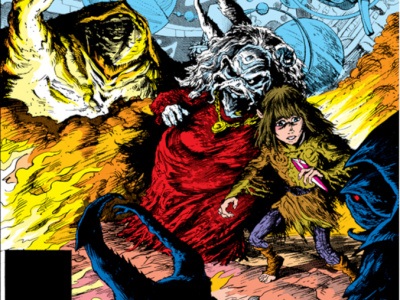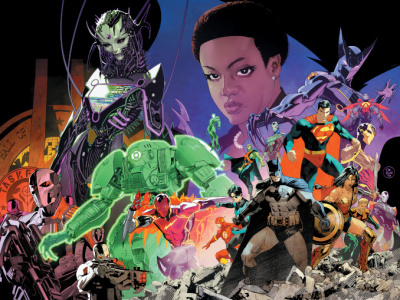
ICv2 recently caught up with Marvel Publisher Dan Buckley for another in our series of interviews with key comic and graphic novel publishers.
In Part One of this three-part interview, Buckley talks about the current state of the comics and graphic novel market, including the possible impacts of the economic turmoil; the impact of increasing bookstore sales on Marvel’s publishing strategy, especially on comics for kids.
In Part Two, we talk about the changing relationship between movies and publishing; Marvel’s digital initiatives; and Marvel’s position on a shift to a universal Tuesday delivery day to retailers.
In Part Three, we talk about highlights of Marvel’s 2009 schedule; more on coordinating publishing with movie releases; and the “connective tissue” between movies and comics.
How does the comic and graphic novel market look for 2008?
In 2008 we’ve been really happy. Year over year it was tough for us to compete against 2007 from a growth standpoint, with the ending of Civil War, the Death of Captain America, the first launch of the Stephen King book, Dark Tower, but we’ve been very happy with what we’ve been able to do this year and how the comics industry has been responding, from our heroes stuff through to our Illustrated Adventures line. And we’ve been very happy with the book market that continues to chug along with very acceptable growth.
Do you think your experience in 2008 is representative of the total market, or more specific to Marvel?
We came out of the gates a little bit slower than other publishers and that had a lot to do with what you do year over year and with the timing of our tentpoles, just the way we scheduled the year. I think some of the larger third party publishers had very good years. Dark Horse specifically has had a great year, and couple other guys have done pretty well.
I think other publishers have probably struggled with year over year growth and consistency with sales numbers, but there’ve also been projects that have worked for everybody. Much of that might have to do with how they do their editorial planning and scheduling.
We’re very excited about the last half of the year. We’re peaking with Secret Invasion; we’re getting Ultimates ramped up. With the King books, between The Stand and Dark Tower Vol. 3, and the second hard cover coming out, we have a lot of broader stroke (for lack of a better term), bigger material to package up and get out. I think if you look at the first half of the year, we looked a little bit slower than the rest of the publishers, but we’ve actually been ramping up so we’re very pleased; it’s been hitting the plan that we expected.
I think other publishers have had fits and starts, and it’s not really for me to comment on that. I think the year all in all will be relatively flat, give or take a couple points, in the hobby market. I know we’ll have some decent growth, and we’ll be happy with the performance of the book market.
Are you seeing any impact of the economy? Do you anticipate any impact on sales going into next year?
It’s hard to gauge that right now, because we’ve been hearing bad news in fits and starts since last August. We’ve been paying very close attention, with the help of Diamond our distribution partner, just keeping an eye on the retail base. Is the credit crunch affecting them yet, have they seen a slowdown in sales? With the feedback we’ve been getting, we haven’t seen a great deal of effect on the absolute numbers. We have heard that there’s some changes in the traffic pattern. People aren’t browsing as quite as much; they’re coming in the store once a week vs. three times a week. It’s a little bit more pull and hold. We’re keeping a close eye on it.
We haven’t seen any huge attrition, especially with the top level books. Some of the lower level books, I think, have been affected. That might be a combination of people having other things to spend their money on and then not using as much disposable income in the stores. But the books they have been collecting or are very interested in on a top level? We’re still moving those books.
As for next year, I can’t project out that far. We’re trying to be conservative on our approach because that’s the best tack. Traditionally, comics as an industry have done comparatively well during recessionary times. We’re trying to be cautious, but I’m being very optimistic at the same time.
We’re in uncharted territory as far as the mix of product between graphic novels and comics. In the past, periodical comics have responded well to bad economic times, they’re cheap entertainment. Graphic novels are little different--do you have any feel for how that’s going to play out?
You’re right, it is uncharted. It’s very uncharted for us as publishers, specifically Marvel. We’ve only been in this business for maybe nine years. We’ll probably be conservative on our inventory position, but we’ll still be very aggressive about getting back to press. Especially nowadays, you can get the things more quickly and get it out there. We haven’t seen a significant slowdown of the market, and we probably won’t see it--if there is one--until first or second quarter of next year, because the holiday market is still very important. And publishing is still relatively cheap from a gift-giving standpoint, especially the products we make.
We like being cautiously optimistic, but you’re right, we’re in uncharted territory so we have to make sure we stay flexible in what we’re doing and be able to react in a way where we can supply the market with the products they need and not overextend everybody.
It was surprising to see the breakdown between Marvel’s sales to direct and bookstore and other channels had changed pretty substantially in the last six or seven years. You’ve talked about the growth of the bookstore channel and the other channels you’ve been trying to reach out to, so it seems more a function of those channels growing rather than direct shrinking. How does the change in channel mix affect your publishing strategy?
It’s very reflective in the product mix. You can look in the catalogue to get a good feel for the product mix and see how it has affected us. It opens up our opportunities to try to get to new readers and present things that are not Marvel superhero product that can potentially bring people on. Stephen King, Anita Blake, Enders Game (which is just launching); The Marvel Illustrated line, Marvel Adventures, Halo--all of those things are direct results of the broadening of our distribution. You can take a slightly different approach in how you monetize that opportunity; there are more channels to get it out there. It has definitely affected what product we bring to bear and what we can bring to the market.
If you had picked up a copy of Marvel Previews six years ago, you would not have seen anything outside of the superhero genre, and now you see a lot of different things.
So more literary adaptations...
That market has offered us the opportunity to explore those things and create product. We’re really pleased with it. It’s created some opportunities that we hoped would happen. Marvel Adventures is a great example. We’ve been banging away at that for four or five years now. We’re very happy with what it was doing from a sub standpoint, and newsstand, and specialty sales between Target and Scholastic offering new reader opportunities. But we finally broke the door down and that product is finally going to be in children’s sections of bookstores. Borders and Barnes, I think. That’s a big pay-off for us; we’re now in a new section of the world. It helps us believe if we keep on making good product, opportunities will broaden the scope for us. If we didn’t have that channel of distribution, we would have done something with Marvel Adventures, but probably not the same level and extent.
With the growth in the last few years and the number of kids reading Marvel comics, are you getting any sense of what happens with the kids that age out?
I don’t have a lot yet. I can tell you qualitatively, conversationally, and from some of the surveying that we’ve done, we are having people, unaided, bring up Marvel Adventures to us--“Oh, I really like the Marvels Adventures line.” We have people asking for it; letters to us appreciating that we’re doing all ages books. Are we seeing the transition period yet? I can’t really speak to that. I don’t think we’ve been at it long enough, but I can tell you we’re getting feedback. Book buyers talk to us like it’s an imprint now, not “Oh, you’re doing some of those all ages books.”
We have to keep on banging away at it and keep on pushing it. We have strong characters and strong brands so we’re blessed with that. A lot of people don’t have that. If we combine the two things and can deliver a product that kids enjoy, and parents are comfortable with, we can keep on growing that base.
Click here for Part Two.







